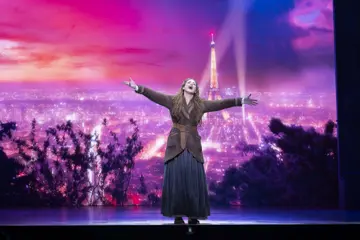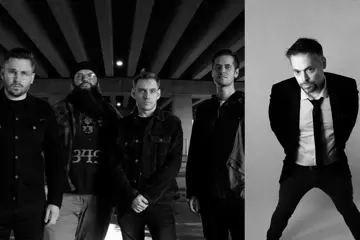Following a re-release of their first album on vinyl, Tumbleweed are hitting the road to play the album live in its entirety for the first time ever. Here, Tumbleweed singer Richie Lewis and guitarist Lenny Curley reflect on writing the songs and making their 1992 self-titled debut.
Richie Lewis: Our debut album came at the tail end of our most fertile and productive period, we had recorded Theatre Of Gnomes and WeedSeed that year and by the time we got to recording the album our bag of songs was looking pretty bare. We had about six or so that we were already playing live and a few of them we had saved for the album, but we needed more, we wrote the remainder in a writing frenzy in the weeks leading up to the recording.
Sundial
Lewis: Sundial started out as Foxy [Lady], Lenny had this riff, he was listening to a lot of Hendrix at the time, this song had been around for a while, although in various guises. We gave up on it for a while too, but then resurrected it for the album, came up with the chorus, which was missing, and when we recorded it for the album it just came together so well and became one of our biggest songs.
Lenny Curley: Yes, I was listening to a lot of Hendrix, the two and a half chord verse riff is the same as Foxy. It was interesting to me because anyone can play that chord progression but only Hendrix can make it sound like Hendrix, when we play it, it sounds like Tumbleweed. It was never written with 'hit single' in mind, it was an exploration of the Hendrix influence and how guitar riffs can be structured and played. I was also very conscious of creating a rhythm with [drummer] Steve [O'Brian] and [bassist] Jay [Curley] when constructing songs, their individual styles gave riffs the Tumbleweed feel, [guitarist] Paul [Hausmeister] would then embellish them and Richie would add his vocal and turn them into songs.
The Healer
Don't miss a beat with our FREE daily newsletter
Lewis: The Healer was one of the earliest Tumbleweed songs and it set us on a new direction, from then on we wanted to get heavier. It was the first song we recorded with this line-up, we did an early version which came out on Fresh From The Womb, a compilation featuring four Sydney bands; Crow, Nunbait, Swirl and Tumbleweed. The version on the album had a different chorus and backing vocals added by [US producer] Mr Colson and a fade out end rather than the big Blue Oyster Cult-inspired ending from the earlier version and live version.
Curley: Richie came to a practice with this song. I dug it instantly and got real excited when we started playing it. It was a revelation as to how we should approach songwriting and who we wanted to be. While in The Proton Energy Pills I was inspired by The Ramones and The Celibate Rifles, the first year of Tumbleweed we were exploring a Dinosaur Jr/Sonic Youth influence. With a single song, we realised that a heavier rock'n'roll approach was not only more fun to play but would it be harder to pinpoint where our influences came from (with the exception of Black Sabbath). We could mix it all together and simply focus on dynamics such as feel, energy and tone rather than what band we were into the most.
White Skin, Black Soul
Lewis: White Skin, Black Soul was written for the album. It started off as an instrumental, Lenny and Paul's interesting guitar interplay create the song's backbone, it surges ahead and we always liked how it was a bit different. Lyrically it is murky, kinda loosely about the guilt one feels being a privileged white boy in a post-colonial Australia. The "nah nah nah"s keep it light.
Curley: As I mentioned earlier the first year of Tumbleweed we focused on the way Dinosaur Jr and Sonic Youth used unconventional chord structures to create songs. White Skin, Black Soul was written in this period prior to The Healer as an instrumental, then Richie resurrected it and added some vocals to it as we needed to find tracks for the album.
A Darkness At Never Never
Lewis: A Darkness At Never Never was one of Paul's. He had heaps of ideas in the studio with this one, the acoustic guitar line, the shifts in tempo, the many layers. I remember Paul gaff taping his headphones to his head, it was hilarious watching him try to get them off. I was reading a lot of sci-fi fantasy novels at the time and totally immersed in the language, it's pretty much a short poem based on the book I was reading. I also had just watched We Of The Never Never, a great Australian film. I always loved this one and the time we spent on it, but we never played it live.
Curley: I didn't waste Paul's time having him teach me how to play this one, he knew what he wanted and I did not get in his way.
God
Lewis: God was originally called 'I Am God' but for the album, I left it as simply God, and then people thought we were Christians, but we weren't. Although, as a boy, I was probably scarred by a few Sunday school stories and parables. This one is about being the first one to forgive. I liked that idea and principle. It was pretty straightforward, this was a live favourite way before the album and it was pretty tight by the time we recorded it.
Curley: Not sure who wrote this one, I think we all contributed. I know I added the chorus riff.
Ocean
Lewis: Ocean was a big, swirling live song. It was a favourite live song for many of our early fans. Growing up in Wollongong, the ocean is a part of our lives, it is the sound we go to sleep to, it is the edge of our territory and the place we spend our summers, it moves and ebbs and flows and I think the feel of the song just felt like the ocean to me.
Curley: Around this time, the first Monster Magnet record came out. I thought the recordings were very powerful without being busy or fast. It was just loose and heavy and at the time we all really dug it. The feel of this song was inspired by that record.
Dandylion Part 1
Lewis: Dandylion Part 1 was a small snippet cut from a big jam, there was no real plan. Steve and Jay had a cool groove going and Paul and Lenny layered it with interesting tones they could wrangle and strangle from their guitars and amps. We screamed into the pick-ups. Lots of feedback, recorded very, very loud. Drugs.
Curley: I am not sure about this one.
Atomic
Lewis: Atomic transformed in the studio at the hands of the American maestro. He sunk his teeth into that one, could see the melodic potential of interesting harmonies in the chorus. It's not really how we had played it live, he changed it, he added the "Mr Peacock" line. I always felt silly singing that line, although it was a hook. People would say, "Play that 'Mr Peacock' song." I've changed it back to what it was now for live renditions of it. We spent a fair bit of time on it, making it sound like a track from War Of The Worlds, great dynamics in that one. Listening back to it I think it's pretty cool what he did, but we probably wouldn't have done it that way if we had total control at the time.
Curley: I liked this song prior to recording it. Now I struggle with it, I still complain when Richie puts it in the set. The producer became a songwriter, his backing vocals are louder than my guitar. He had no concept of our desire to sound heavy and loose. To me it sounds empty and way too tight.
Acidrain
Lewis: Acidrain was born during a night of tripping in my backyard. The guys from Crow and Nunbait came down from Sydney. Their silhouettes were stoking the dying embers of a fire in the backyard, Jay and I were coming down, we escaped to the lounge room and watched the lilac sky of dawn approach. He was noodling around on an acoustic guitar playing the bass line from Acidrain, I asked him what it was, he said he didn't know, he was just making it up. I came up with the line "If I tried to bring you sunshine but I failed to stop the rain" and sang along with him, we kind of nutted out the bones of the song there and then, then went out and joined the others at the fire. When we recorded it, Doug Colson edited it to pieces, he actually cut the tape up into five-centimetre lengths - there was tape stuck to the walls all over the studio - he cut it up and put it back together again. This was before Pro Tools, so that's how you did it, cut and paste was a real thing, he also got some guy who played shakers on a Bruce Springsteen album to play the egg shaker on it.
Curley: This song came together very naturally after its original conception by Jay and Rich. Paul and myself came up with guitar lines instantly without having to think too hard about it. It was our only slower song and Steve created a great feel for it. This is my favourite track from the album as the song suits the recording.
Starseed
Lewis: Starseed was written for the album, it was pretty fresh, lyrics were written in the studio, we were really stoned and reading Nexus Magazine and watching Chariots Of The Gods.
Curley: This was a last-minute song written for the album that may have been shelved had we not been recording an album the week we wrote it. The riff is inspired by a Thee Hypnotics song called Choose My Own Way.
Dreamchaser
Lewis: Dreamchaser was always called 'Why?' on setlists, it's still called 'Why?' on set lists. This was a great early Tumbleweed song, great feel and cool end section. The lag in the playing caused havoc with the perfectionist producer. The real beauty of the riff is how it hangs on a bit longer than it should. He tried to get Steve to play it to a click track. That was a dumb idea, didn't work at all, totally killed it, so we did away with that silly thing and went back to doing it how we do it.
Curley: My other favourite album track.
Dandylion Part 2
Lewis: Dandylion Part 2 - throughout the recording session if Mr Colson wanted a change in pace he would keep coming back to Dandylion Part 2 and send us back into the live room to add more stuff; tones, talking, whispering, screaming, percussion etc. He put a microphone in a vase and recorded the mix from speakers at the other end of the room, put a microphone on the fire stairs and recorded the sound of the mix coming down the hall, stuff like that. It was fun, I think we recorded making sounds out of kitchen utensils, recorded a slinky slinking down the stairs, there is a lot in that sonic nightmare.
Curley: This track highlights how desperate we were to fill out the record. While it was probably fun to make, I imagine it is greeted with the fast-forward button quite a lot. While I am a huge fan of experimental music I am not a fan of this track. To me it sounds like noise for the sake of noise and I apologise for any part I played in it.















